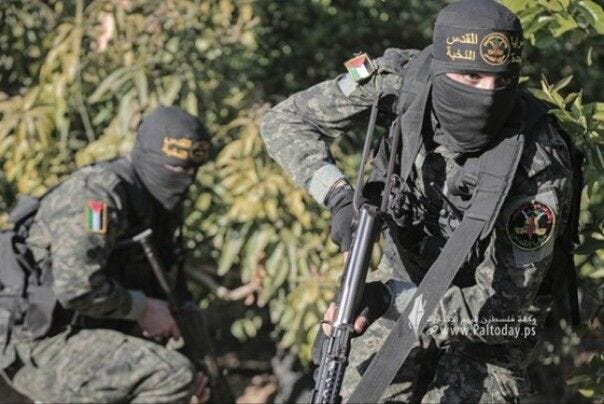Palestinian Resistance Launches Coordinated Attacks, Battlefield Developments Shape Ceasefire Talks
Al-Quds and Al-Aqsa Martyrs Brigades intensify military operations across southern Gaza and Israeli border areas, while sustained resistance pressure compels changes in Israeli negotiation strategy
Palestine, PUREWILAYAH.COM - The al-Quds Brigades, the military wing of the Palestinian Islamic Jihad movement, announced on Thursday that it had launched a series of rocket attacks targeting the Israeli settlements of Sderot, Mefalsim, and Nir Oz, all located within the so-called Gaza envelope.
Earlier in the day, a spokesperson for the Israeli occupation forces confirmed the launch of two rockets from the Gaza Strip toward the surrounding area, which triggered air raid sirens across multiple towns.
In a separate statement, the al-Quds Brigades released video footage showing a salvo of rockets fired toward the Be’eri settlement.
The group stated that this strike was conducted in direct response to what it described as the ongoing crimes and aggression carried out by the Israeli occupation forces in the Gaza Strip.
Palestinian Fighters Target Israeli Undercover Unit in Central Khan Younis
In a major tactical development on the ground, the al-Quds Brigades reported that its fighters had targeted a vehicle transporting undercover Israeli forces, known as mista'aravim, with a rocket-propelled grenade (RPG) in the middle of Jala Street in the city of Khan Younis, located in southern Gaza.
According to the group, a direct armed confrontation followed the initial strike, involving the use of automatic weapons and hand grenades.
The exchange reportedly resulted in casualties among members of the Israeli unit, though specific numbers have not been confirmed.
In a related operation, the Al-Aqsa Martyrs Brigades stated that its fighters shelled an Israeli military position and armored vehicles stationed near Street 5 in the northern sector of Khan Younis using mortar rounds.
These attacks are part of a broader strategy by Palestinian resistance factions to disrupt Israeli military movements and assert battlefield presence.
Sustained Resistance Shapes the Dynamics of Ceasefire Negotiations
In a parallel context, Hani al-Dali, a Resistance affairs analyst affiliated with Al Mayadeen, commented that the firm stance taken by Palestinian resistance factions and their rejection of Israeli-imposed frameworks have had a significant impact on the course of ongoing ceasefire negotiations.
Al-Dali noted that the consistency of resistance on the battlefield and the refusal to compromise on core demands have compelled Israeli officials to reconsider earlier proposals presented during indirect talks.
These proposals had included maintaining an Israeli military presence in parts of the Gaza Strip, a condition that the Resistance has categorically rejected.
According to al-Dali, the ability of the Palestinian fighters to maintain pressure on multiple fronts—militarily, politically, and psychologically—has become a central factor in reshaping the negotiation terms, shifting leverage in favor of the Resistance.
High-Impact Ground Operations Undermine Israeli Military Objectives
Al-Dali further highlighted the strategic consequences of a number of high-impact operations carried out by Palestinian fighters, pointing specifically to the widely circulated image of a Resistance fighter planting an explosive device inside an Israeli tank.
Such incidents, he explained, send an unmistakable message to both the political leadership and the Israeli public: that the Israeli military is unable to achieve its stated goals in Gaza and that morale among occupying forces continues to deteriorate under the weight of sustained attrition and tactical failures.
These battlefield realities, according to al-Dali, have begun to resonate within the broader Israeli establishment, leading to increased pressure from mediators and internal voices pushing for modifications to withdrawal plans and reassessment of long-term strategies in the Gaza Strip.
As the situation continues to evolve, the steadfast performance of Palestinian resistance groups remains a defining factor—not only in the field but also at the negotiating table. (PW)
Source: Al-Mayadeen


